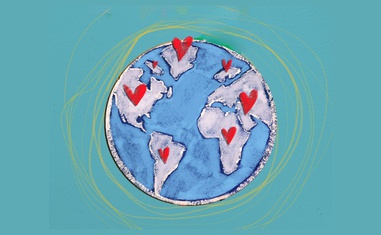The views expressed in our content reflect individual perspectives and do not represent the authoritative views of the Baha'i Faith.
An online forum essayist, whom I’ll call Jen, criticized the Baha’i Faith after she skimmed The Promise of World Peace, a 1985 message from the Universal House of Justice to the peoples of the world.
How do I know she only skimmed the message rather than reading it carefully? She took exception to the Baha’i International Community working with the United Nations, saying, “The Baha’i faith sees the United Nations as the vessel by which the unifying of the world’s religions into one faith will come to fruition.”
Apparently, Jen had not read the entire Universal House of Justice message or any other authoritative Baha’i literature. Her completely mistaken assertion echoed some of the “cult bashing” books I’d collected back in the day.
In reality, Baha’is see the United Nations as a welcome indication that humankind is approaching maturity. While we recognize it — and every other global development that prioritizes unity — as part of God’s plan for peace and human oneness, the UN is a secular and political entity, and Baha’is most certainly do not see it in the way Jen describes. Rather, we view the word of God and the Holy Spirit as the agents for this inevitable change.
Baha’u’llah, the prophet and founder of the Baha’i Faith, wrote:
The vitality of men’s belief in God is dying out in every land; nothing short of His wholesome medicine can ever restore it …. The Word of God, alone, can claim the distinction of being endowed with the capacity required for so great and far-reaching a change.
Does this mean Baha’is believe the word of God will magically transform mankind? Emphatically, no.
The Baha’i teachings make it clear that the word of God will only bring about this change if we — human beings — put it into practice. Scripture makes this abundantly clear, as well, in passages such as this prophecy from Isaiah 2:3-5 in Jewish scripture:
Many people shall come and say, Come, and let us go up to the mountain of the Lord, to the house of the God of Jacob; and He will teach us his ways, and we will walk in His paths,” For out of Zion shall go forth the Law and the word of the Lord from Jerusalem. He shall judge between the nations, and rebuke many people: they shall beat their swords into plowshares and their spears into pruning hooks: nation shall not lift up sword against nation, neither shall they learn war any more. O house of Jacob, come, and let us walk in the light of the Lord.
RELATED: The Only Solution to Our Economic Problems: The Oneness of Humanity
Notice that Isaiah’s prophecy does not say that God will beat our swords into plowshares for us, but that we will do it in response to His word. Christ affirmed this in John 12:48, telling his disciples that in the “last days,” humanity will be judged by how we keep the word:
… I did not come to judge the world but to save the world. He who rejects Me, and does not receive My words, has that which judges him — the word that I have spoken will judge him in the last day.
Finally, Baha’u’llah clearly stated that it is putting the word of God into action, which will bring about the unity and peace promised by the prophets:
It is incumbent upon every man of insight and understanding to strive to translate that which hath been written into reality and action …. That one indeed is a man who, today, dedicateth himself to the service of the entire human race.
After mischaracterizing the Baha’i view of the United Nations as mankind’s only hope for unity and peace, Jen quoted a snippet of a passage from Shoghi Effendi’s World Order of Baha’u’llah: “… the oneness of humanity implies an organic change in the structure of present-day society, a change such as the world has not yet experienced …”
She then commented that Baha’is:
… promote a redistribution of wealth and a communist system of government … This brings to mind the Antichrist’s future financial system in which no one will be able to buy or sell without the mark of the Beast.
The giant leap from “organic change” to “redistribution of wealth” and to “communist system of government” and “mark of the Beast” stunned me, especially given that Shoghi Effendi, the Guardian of the Baha’i Faith, characterized communism as one of the great ills of modern society.
All economic systems, including capitalism, involve the redistribution of wealth. Some have even limited who can buy and sell — consider the Iranian government’s long-standing curtailment of Baha’i businesses and property rights. But nowhere in the Baha’i teachings does Baha’u’llah promote a forced redistribution of wealth. In fact, he said that this more equitable redistribution would be carried out initially and voluntarily by wealthy individuals. This is already happening thanks to people like Warren Buffet, George Lucas, Bill Gates, and other philanthropists. They are not Baha’is, yet have voluntarily redistributed their wealth to confront some of the world’s most pressing problems.
An organic process such as Shoghi Effendi described cannot be imposed by one group on another, and an organic process is exactly what Christ described when he was asked what the coming of God’s Kingdom will be like in Matthew 13:
The kingdom of heaven is like a mustard seed, which a man took and sowed in his field, which indeed is the least of all the seeds; but when it is grown it is greater than the herbs and becomes a tree, so that the birds of the air come and nest in its branches. … The kingdom of heaven is like leaven, which a woman took and hid in three measures of meal till it was all leavened.
Baha’is accept Christ’s God-inspired words on the establishment of the Kingdom of God — that it will come little by little with time and effort until, at last, we beat our swords into plowshares, as the prophet Isaiah foretold. The seed Christ sowed during his lifetime may have seemed like the “least of all the seeds”, but can anyone doubt the spread of its branches?
Jen continued by saying: “While the Baha’i (sic) praise the United Nations as the only hope for the ‘world peace promised by all the major religions,’ they are … a loud voice … for stepping up the pace of our ‘spiritual evolution’.”
RELATED: The Place I’d Most Like to Visit Doesn’t Exist – Yet
This would be a paradox if it were true — but it’s not.
Baha’is praise the efforts of the UN in its attempts to guide the nations according to humanitarian principles, but we do not view it as the “only hope” for world peace. It certainly represents a step in that direction, but again, the Word of God — and the extent to which we keep it — remains our greatest hope for peace or any other form of progress.
Here is the context of the passage from Shoghi Effendi’s pen of which Jen shared only a part:
Let there be no mistake. The principle of the Oneness of Mankind — the pivot round which all the teachings of Baha’u’llah revolve — is no mere outburst of ignorant emotionalism or an expression of vague and pious hope. Its appeal is not to be merely identified with a reawakening of the spirit of brotherhood and good-will among men, nor does it aim solely at the fostering of harmonious coöperation among individual peoples and nations. … Its message is applicable not only to the individual, but concerns itself primarily with the nature of those essential relationships that must bind all the states and nations as members of one human family. It does not constitute merely the enunciation of an ideal, but stands inseparably associated with an institution adequate to embody its truth, demonstrate its validity, and perpetuate its influence. It implies an organic change in the structure of present-day society, a change such as the world has not yet experienced.
The institution Shoghi Effendi refers to here is not the United Nations, but the democratically-elected Baha’i administrative order — an institution designed by Baha’u’llah himself. Supported by Local and National Spiritual Assemblies in every locality and country where Baha’is reside, the capstone of this administrative order is the global Universal House of Justice, which guides the Baha’i worldwide community from its seat on the slopes of Mount Carmel in Israel.
This prophecy of Isaiah seems applicable here:
For unto us a Child is born, unto us a Son is given; And the government will be upon His shoulder. And His name will be called Wonderful, Counselor, Mighty God, Everlasting Father, Prince of Peace. Of the increase of His government and peace there will be no end … The zeal of the Lord of hosts will perform this.

















Comments
Sign in or create an account
Continue with Facebookor